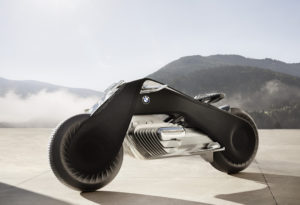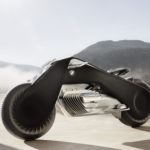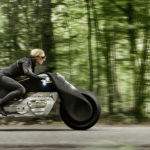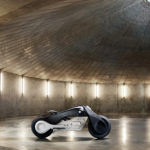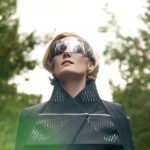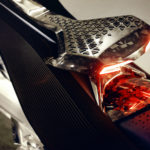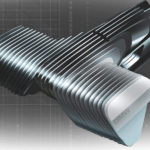BMW’s vison for the future of Motorrad
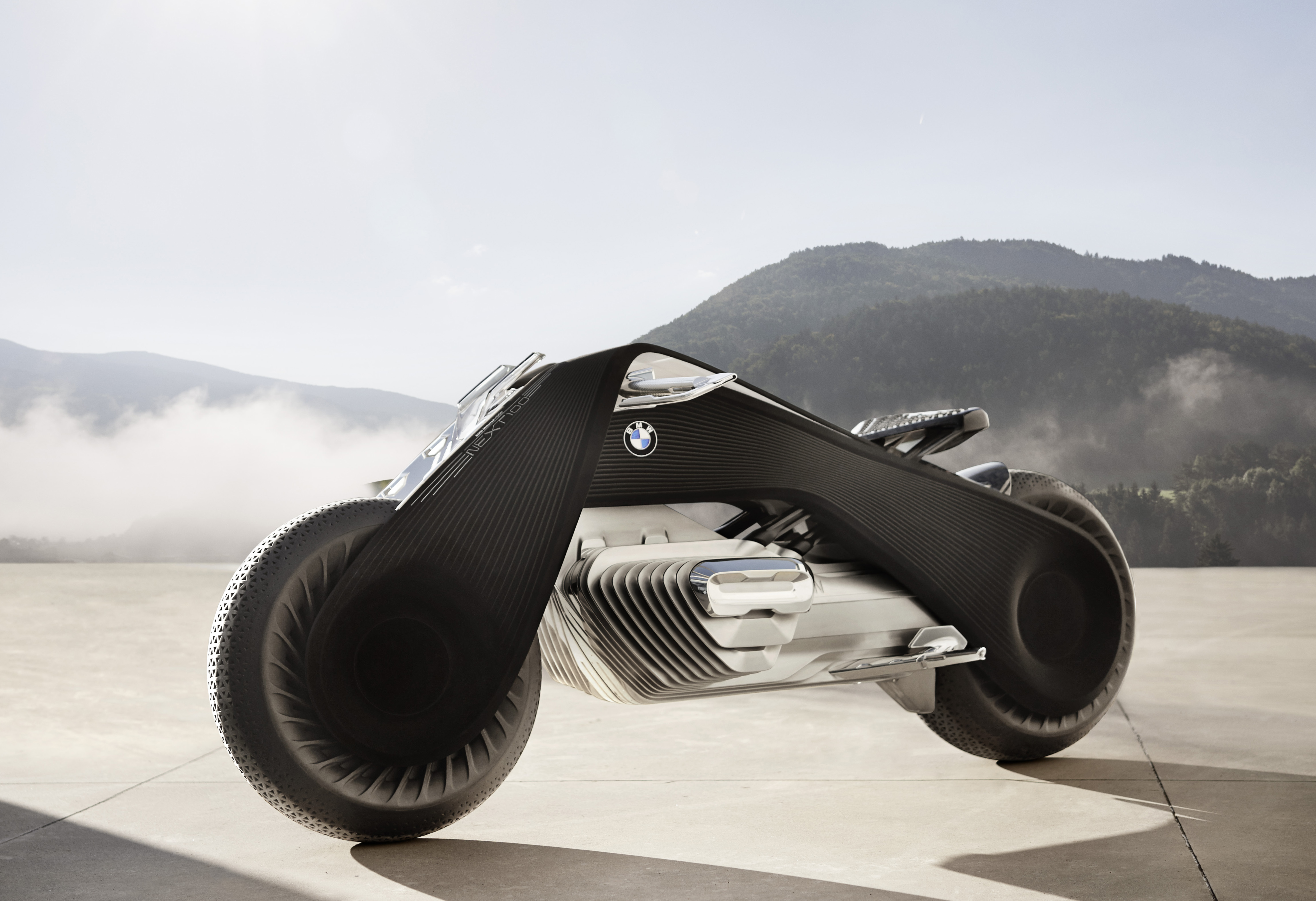
It’s not surprising that BMW is looking forward to the next 100 years of driving and riding, having reached it’s first 100 years as a dominant force in the industry. It’s Vision Vehicles are concepts that aim to address the “mobility needs” of commuters in the next 30 years.
Assuming that life is only going to be more connected and increasingly urban than it is now, BMW has laid out some concepts that allow the digital to mesh seamlessly with the analog…. or so it has been said.
The press release below details the Motorrad concept in rich language and vivid descriptions of technologies which I imagine to be only half-functioning or nonexistent at this time. What the hell do I know, however?
The concepts that are described within the text make me feel a little like riding a motorcycle in the future is going to be somewhat like playing a video game in this day and age.
The self-balancing motorcycle will be the “perfect synthesis between human an machine”, but the more I read, the more I doubted that sentiment.
The description of the bike started out ok, even if there is no suspension other than the tires, and the gauges, grips, and seat padding are absent as well.
The real kicker was when I read that the bike was uncrashable (not their exact words, but it was implied) and that the onboard electronics “will consign the helmets and body protectors of today to the history books”. (Their words)
The features went on to describe digital technologies and assistive systems that help riders pilot the self-balancing machine. Another feature is the Digital Companion – a silent partner who always has your back, but will only dish out information or support if you ask for it or legitimately need it.
Then there’s the Visor..
It’s basically a HUD that feeds you constant information and analyze your every move. It is controlled partially by the eyes and, other times, by the hand. Data and intelligent systems are constantly being processed in the background, but can be called up with the flick of the eye. Ok, so that’s not really a saying, but that’s all it takes to access the display data being projected in the corners of the visor.
It also shows current bank angle, similar to a fighter jet, as well as recommended bank angles and cornering lines. Think of your favorite racing game in easy mode with all of the racing lines and track map turned on, as well as your gauges and telemetry being displayed at the same time… yeah, just like that.
One major feature of the Visor’s data collection and assistive capability is to take corrective action to prevent a crash should the rider fail to do so. BMW states that this will provide novice riders with a way to learn where to limits are safely, while allowing seasoned riders to improve their skills in the same way.
I’ll let the BMW folks set the record straight and lay out the details with their beautifully crafted press release below:
The following is a BMW press release:
BMW Motorrad VISION NEXT 100: The Great Escape
Munich/Los Angeles. In 2016, its centenary year, the BMW Group is looking further into the future than ever before and developing a series of Vision Vehicles to address people’s mobility needs in about three decades from now. Its solutions are based on the assumption that mobility is set to become increasingly multifaceted and connected.
Following the BMW, MINI and Rolls-Royce Vision Vehicles, the BMW Group has now revealed its next progressive solution, this time for the world of motorcycling: the BMW Motorrad VISION NEXT 100. It was unveiled on 11 October at the “Iconic Impulses. The BMW Group Future Experience” exhibition in Los Angeles.
The Great Escape
“The BMW Motorrad VISION NEXT 100 embodies the BMW Group’s vision of biking in a connected world – an analogue experience in a digital age. Motorcycling is about escaping from the everyday: the moment you straddle your bike, you are absolutely free. Your bike is The Great Escape,” says Edgar Heinrich, Head of Design at BMW Motorrad, outlining the core principles underlying his brand’s Vision Vehicle.
The BMW Motorrad VISION NEXT 100 stands for the ultimate riding experience. Liberated from the need to wear a helmet and protective clothing, the rider is able to enjoy the forces. Acceleration, wind and nature as in touch with the surrounding world, savouring every moment. The design of the BMW Motorrad VISION NEXT 100 represents the essence of the motorcycle: the perfect synthesis between human and machine. Every detail is of the highest quality and the design incorporates all the most striking visual aspects of BMW Motorrad bikes across the ages. These elements, however, have a contemporary twist, both visually and in terms of function.
The iconic elements in the BMW Motorrad VISION NEXT 100 make it immediately recognisable as a “genuine BMW” and include the black frame triangle, white lines and classic, boxer engine forms. The bike itself, however, is powered by a zero-emissions solution.
The BMW Motorrad VISION NEXT 100 unites the past of the BMW Motorrad brand with its future and is a powerful expression of both.
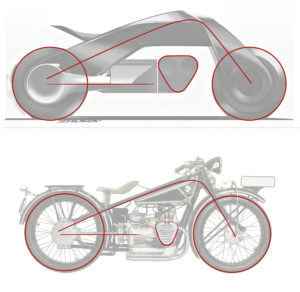 The frame triangle – a classic icon reinvented
The frame triangle – a classic icon reinvented
The black frame triangle of the BMW Motorrad VISION NEXT 100 is a deliberate reference to the first ever BMW motorcycle, the R32, made in 1923. On the vision bike, however, it has been reinterpreted to form a functional sculpture linking the front and rear wheels with a dynamic sweep. Bearings and joints are nowhere to be seen; instead the frame appears as a single, integrated whole.
Viewed from the side, the frame of the BMW Motorrad VISION NEXT 100 lends it the character of a naked bike, with ergonomics to match and a seat in the roadster position. The clever arrangement of surfaces protects the rider from wind and weather as effectively as a full fairing. The surface of the frame is covered in matt black textile, its silky sheen and fine lines highlighting the characteristic forms and representing a contemporary reinterpretation of this classic BMW detail. The BMW logo is optimally displayed on the dark frame. It is illuminated in the familiar blue and white colours while driving.
Flexframe – frame-assisted steering
The Flexframe appears as a single, integrated whole that extends from the front to the rear wheel of the BMW Motorrad VISION NEXT 100. Being flexible, it allows the bike to be steered without the various joints found on today’s motorcycles. Turning the handlebar adjusts the entire frame, changing the direction of the bike. The amount of strength needed to steer depends on the situation: at standstill, the Flexframe allows a light steering whereas at higher speeds it remains very rigid.
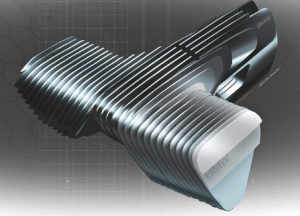 Powertrain – inspired by the BMW boxer engine
Powertrain – inspired by the BMW boxer engine
In the middle of the triangle frame sits a style feature and historical reminder: the power unit. Designed and created in the image of the traditional BMW boxer engine, it actually consists of a zero-emissions drive unit. Its outward appearance changes depending on the circumstances: when the bike is resting, the power unit is compact, extending outwards only when the bike sets off, to enhance aerodynamics and protect the rider from the elements. Its polished aluminium finish confirms the superior quality of this component.
Minimalist form, maximum quality of details
The slender-looking BMW Motorrad VISION NEXT 100 clearly expresses its qualities as a riding machine. The front is minimalist in design and enhanced with high-quality details. Integrated into the frame above the front wheel is a large metal reflector incorporating the two vertically positioned, U-shaped elements that make up the daytime running light. It also acts as a wind deflector and, in combination with the small, integrated windshield, helps to optimise the air flows. Body elements such as the seat, upper frame cover and wings are made of carbon. Beneath the seat shell, two fine, red, illuminated strips form the rear light and indicators – picking up on the typical double-C form of the rear lights on today’s BMW Motorrad bikes – but with a new, futuristic twist.
Damping is provided by the tyres, whose variable tread actively adjusts to suit ground conditions and ensure the best possible grip in any situation.
Analogue elements in the digital age
Overall, displays, cables and buttons are a rare sight on the BMW Motorrad VISION NEXT 100. But amid the clear forms of its front is one element that immediately stands out: a red rocker-switch on the right-hand end of the handlebar. This obviously mechanical element blocks or releases the throttle grip and is a homage to the analogue days of original biking. The hand levers with their outward-facing joints are also a reminder of days gone by.
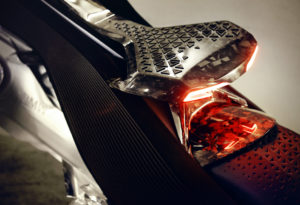
BMW Motorrad VISION NEXT 100:
What kind of world will be home to the motorcycle of the future?
“Normally, when we develop a motorcycle, we tend to think 5 to 10 years in advance. On this occasion, we looked much further ahead and found the experience especially exciting. There are some very attractive prospects. I firmly believe the BMW Motorrad VISION NEXT 100 sets out a coherent future scenario for the BMW Motorrad brand,” explains Edgar Heinrich.
When designing the BMW Motorrad VISION NEXT 100, the team was thinking decades in advance. In tomorrow’s world, connectivity and digitalisation will be all-encompassing. Most vehicles will be driverless, and life will be organised largely by digital services. More and more of the world’s population will be living in urban areas.
Digital technologies for an analogue experience
Building on the benefits of the digital world, the BMW Motorrad VISION NEXT 100 takes the analogue riding experience to a completely new level. The unique sensation of freedom is made possible by intelligent connectivity between rider, bike and the outside world – a combination that also allows the prediction of critical situations on the roads. In conjunction with the active assistance systems, these connected elements help keep riders of the BMW Motorrad VISION NEXT 100 in complete control of their ride. As well as anticipating what lies ahead and alerting the user when action is needed, they offer active rider protection and will consign the helmets and body protectors of today to the history books.
“Self-balancing” – active, intelligent assistant systems
In certain situations, the active assistance systems of the future will also enhance stability and safety by automatically balancing the motorcycle, both out on the road and when stationary. Novice riders will benefit from additional guidance in all riding situations and from a bike that will never tip over.
The BMW Motorrad VISION NEXT 100 rights itself while even stationary, remaining upright when the rider has dismounted. The balancing systems also work out on the road to ensure a particularly agile and dynamic riding experience with even lighter handling, which seasoned riders will appreciate, and all the benefits of assistance systems to enhance their capabilities even further. The BMW Motorrad VISION NEXT 100 helps every biker become more proficient and enjoy an even more positive riding experience. Every trip becomes a journey of freedom, from beginning to end.
The Digital Companion – Connected. Ubiquitous. Discreet.
When combined, the BMW Motorrad VISION NEXT 100 bike and the special rider’s gear that has been designed to accompany it form a single functional unit: a Digital Companion that provides the situational information and active support the rider needs. But because biking is essentially about the experience, the Digital Companion remains in the background: though constantly active, it works away unnoticed until required to issue an alert via the user interface or provide active assistance, for instance. Unless the rider or circumstances require it, the Digital Companion remains silent.
“A key point with the BMW Motorrad VISION NEXT 100 was to make sure the constant digital presence doesn’t undermine the analogue riding experience. The display and operating concept works so subtly that the rider can enjoy an entirely natural biking experience, trusting the bike completely and enjoying complete freedom and ease. As interface designers, our job is to deliver the right amount of the right information at the best possible time and place,” explains Holger Hampf, Head of User Experience at the BMW Group.
The visor – the right information at the right time
Information exchanges between rider and bike take place largely via the visor. This essentially consists of a pair of data glasses that extends across the wearer’s entire field of vision. As well as providing wind protection, it shows relevant data in one of four designated display areas. These are controlled by the rider’s eye movements: looking up or down changes the content that appears, and looking straight ahead switches the information off completely, leaving the rider to focus even more fully on biking experience. Information is only projected onto the visor on request, or to alert the rider to the fact that action is needed.
“The bike has the full range of connected data from its surroundings and a set of intelligent systems working in the background, so it knows exactly what lies ahead. By collating the data it has gathered, it can suggest ideal lines and banking angles, or warn riders of hazards ahead,” Hampf continues. When suggesting lines and angles, the Digital Companion appears in the lower third of the field of view, represented by an upturned triangle from which two horizontal lines extend outwards. Like the display in an aeroplane cockpit, this symbol indicates the current banking angle and ideal lines. If the bike’s current position does not match what is suggested, the rider can correct it as necessary. If he or she responds too late or not at all, the bike will correct itself. The Digital Companion’s advice not only helps novices to learn more about what they and their bikes can do. It also supports experienced riders by allowing them to challenge themselves and continuously improve their skills.
Looking upwards activates the rear-view function in the visor, allowing the rider to see what is going on on the road behind. Lowering the eyes to normal levels opens a menu from which the rider can select an option by pointing a finger. Looking further down opens the map view showing the rider’s chosen route.
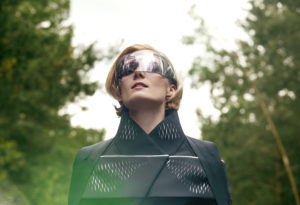
Smart. Active. Flexible – rider’s equipment
The rider’s gear accompanying the BMW Motorrad VISION NEXT 100 is integral to the unique overall experience. In classic black and white, the airy suit enhances the sense of freedom and is both fashion statement and weather-wear. Depending on conditions, it warms or cools the user. While the diagonal zipper across the chest is reminiscent of traditional motorcycle clothing, the flexible, banded structure of the suit and shoes is inspired by the muscle areas of the human body and provides body support and relief whenever needed.
At higher speeds, the neck section inflates to provide extra support for the upper vertebrae and improve overall comfort. Variable openings offer additional ventilation. Unlike present-day suits, however, the futuristic outfit for riders of the BMW Motorrad VISION NEXT 100 offers no safety features, because the bike’s intelligent assistance systems make them superfluous. Instead, sensors in the suit keep track of the wearer’s pulse rate and body temperature and provide the right level of heat or cold. The suit also delivers navigation instructions via the vibrating elements in the arms and legs, and alerts the rider when the banking angle is becoming critical. Rider and machine form a single functional unit to offer a more intense riding experience than ever before. Edgar Heinrich sums up: “The BMW Motorrad VISION NEXT 100 unites the best of both worlds – digital and analogue – for the ultimate emotional experience: The Great Escape.”
If you have any questions, please contact:
The BMW Group
www.bmwgroup.com
Facebook: http://www.facebook.com/BMWGroup
Twitter: http://twitter.com/BMWGroup
YouTube: http://www.youtube.com/BMWGroupview
Google+: http://googleplus.bmwgroup.com
- Photo/Courtesy BMW Motorrad
- Photo/Courtesy BMW Motorrad
- Photo/Courtesy BMW Motorrad
- Photo/Courtesy BMW Motorrad
- Photo/BMW Motorrad
- Photo/Courtesy BMW Motorrad
- Photo/Courtesy BMW Motorrad

